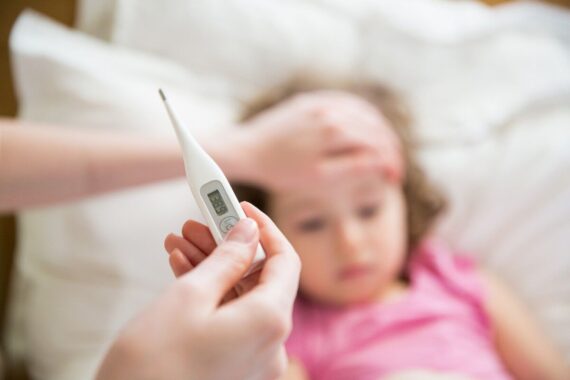Public health officials in Wales are urging pregnant women and parents to ensure they are up to date with whooping cough vaccine after a rapid rise in cases.
There have been 135 notified cases so far in January, compared with about 200 in the whole of 2023, Public Health Wales said.
Officials fear the figures are the start of a relatively large wave of cases after a post-pandemic period of low numbers.
Current notifications are at levels not seen since 2012 and 2015, the figures suggest.
Rates of six-in-one vaccine uptake remain fairly high in Wales, public health teams said but there has been a drop in pregnancy immunisations from 80% to 70% in the past year, figures suggest.
Expectant mothers in the UK have been offered pertussis vaccination since 2013 to help protect newborn infants in the eight weeks before they are eligible for the jab.
The UK Health Security Agency (UKHSA) has also warned this month of rising cases of whooping cough and measles in England with some GPs having never see a case before in their career.
In Essex, GPs received a warning from UKHSA before Christmas of ‘a number of cases’ of Pertussis (or whooping cough) in the community, all of which were unvaccinated.
But immunity to pertussis can wane even in those who have been fully vaccinated, officials added.
The total number of whooping cough notifications to the agency in 2023 across England and Wales was 1737, which is more than three times the number in 2022.
Vaccine uptake in pregnancy in England has also fallen to 60.7% in 2022/23 compared with 64.7% and 67.8% the two years before that.
UKHSA has also published updated information for patients diagnosed with whooping cough reminding people to stay at home for the first three weeks of the illness to stop the spread and avoid being around young babies or pregnant women.
Those who have started antibiotics should also wait 48 hours before going back to nursery, school or work.
Dr Christopher Johnson, consultant epidemiologist and head of Public Health Wales’ Vaccine Preventable Disease Programme said because rates of whooping cough peak every three to four years, the current high numbers were part of a natural resurgence.
‘Whooping cough is highly contagious and is spread by breathing in small droplets in the air from other people’s coughs and sneezes.
‘Babies under six months old are at most risk. It can be very serious and lead to pneumonia and permanent brain damage. Young babies with whooping cough are at risk of dying from the disease.’
‘We would urge all pregnant women and parents of babies and young children to ensure they take up their offer of vaccination when given, or to ask their GP, midwife or health visitor if they believe they may not have had it.’
Pulse October survey
Take our July 2025 survey to potentially win £1.000 worth of tokens














Just to point out that pertussis vaccinations ONLY protect the person who has had the vaccination. Vaccinated people can still contract and transmit pertussis infection, even if totally devoid of all symptoms, so adult vaccination does nothing to protect babies – excepting that pregnant ladies can pass on antibodies to the baby in utero and possibly in breast milk, but not in formula milk.
Natural transmission does vary year by year, but is always present in the community due to onward transmission by asymptomatic adults with immunity to the TOXIN (but not to infecting B.p. bacteria), and it is only detected if you have the typical cough or severe illness in babies.